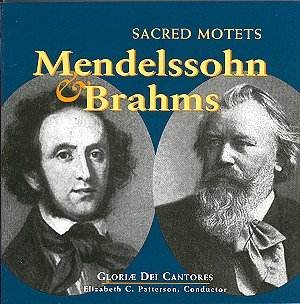Apart from some niggling ragged starts here and there
and some not quite confidently taken solo phrases, it would be churlish
to criticise the ensemble and commitment of this splendid group,
two of whose discs I have reviewed elsewhere on this website, including
a splendid Rheinberger collection (CD 108). Both of the composers
featured here take a retrospective view with their unequivocal admiration
for Bach and his predecessors, the Renaissance masters, the Venetian
School, Gabrieli, Schütz and the like. Steeped in counterpoint
with its intricacies of weaving and intertwined lines for single
and double choruses, Mendelssohn excels in all the challenges which
he not only meets head-on but proceeds to reduce to simple solutions.
In doing so he never sacrifices beauty to the demands of academicism,
always sensitive to the texts and his Lutheran religion. His writing
also owes much to the burgeoning tradition of the German male-voice
choir: usually an offshoot of the country’s industrial revolution
which organised such choirs among factory workers in an effort to
sustain extra-mural social intercourse among the employees. Brahms
once observed with a touch of self-deprecating humour that he was
‘practising Mendelssohn’s G minor piano concerto so that one day
I may really be quite lovable’. There was, however, a serious vein
of admiration coursing through his body, and he more than rises
to the countrapuntal challenges he sets himself in the three pieces
featured here.
Without doubt, however, the best music is Mendelssohn’s
three motets for female chorus accompanied by organ, which were
dedicated to the nuns of Trinità de’ Monti in Rome.
The music is glorious, and the ladies of Gloriae Dei Cantores
ably supported by the organist James Jordan sing it divinely.
It all comes as somewhat of a welcome relief from the 45 minutes
of a cappella music which precedes it, superb though much
of that is. Generally the trio and quartet of soloists have an
excellent blend, while the concluding Alleluia for all
the ladies and the organ in plena voce has a brightly vibrant
timbre and exciting dynamic. For followers of this accomplished
vocal group of forty singers, I can recommend this disc as a valuable
addition to their ever-growing and evergreen collection.
Christopher Fifield
|
Error processing SSI file
|

![]() Gloriae Dei Cantores/Elizabeth
Patterson
Gloriae Dei Cantores/Elizabeth
Patterson ![]() GLORIAE DEI CANTORES
GDCD 107 [75.45]
GLORIAE DEI CANTORES
GDCD 107 [75.45]